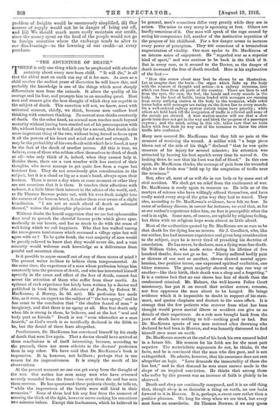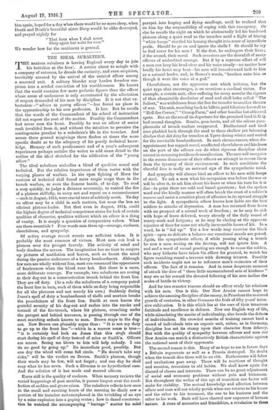"TILE ADVENTURE OF DEATH."
THERE is only one thing which can be prophesied with absolute certainty about every new-born child. "It will die," is all that the ablest man on earth can say of it for sure. As soon as a child reaches the earliest years of discretion he will know this, and probably the knowledge is one of the things which most sharply differentiate man from the animals. It alters the quality of his oourage and his fear, and prompts him to an unending quest. Most men and women give the best thought of which they are capable to the subject of death. This assertion will not, we know, meet with universal consent, chiefly, we think,, because men confuse hard thinking with constant thinking. No normal man thinks constantly of death. On the other hand, no normal man reaches much beyond maturity without having been startled out of his preoccupation with life, without being made to feel, if only for a second, that death is the more important thing of the two, without being forced to focus upon It all the powers of his heart and mind and soul and strength. It may be the probability of his own death with which he is faced, it may be the fact of the death of another person. All this is true, we believe, even of those who seldom allow themselves to think of death at all—who only think of it, indeed, when they cannot help it. Besides these, there are a vast number with less control of their thoughts, who never manage to got quite free from a vague but Insistent fear. They do not consciously give consideration to the subject, but it is a cloud as big as a man's hand, always upon their horizon. There is never a day when at some moment or other they are not conscious that it is there. It touches their affections with sadness, it a little blurs their interest in the affairs of the world, and, as Sir Thomas Browne points out, with his ever-fresh insight into the corners of the human heart, it makes them ever aware of a slight humiliation. "I am not so much afraid of death as ashamed thereof," writes the philosophic physician of the past.
Without doubt the horrid suggestion that we are but ephemerides does tend to quench the cheerful human pride which glows spas- modically in our hearts, and has so much to do with the sense of well-being which we call happiness. Who that has walked among the moss-grown tombstones which surround a village spire but will agree with us ? To be quite frank, the vast majority of men would be greatly relieved to know that they would never die, and a vast minority would welcome such knowledge as a deliverance from painful and recurrent alarm.
Is it possible to argue oneself out of any of these states of mind ? The present writer inclines to believe them temperamental. At the same time, the experience of a man whose profession brings him constantly into the presence of death, and who has interested himself specially in the cause and effect of the fear of death, cannot but arrest the attention of those who suffer from tinter mortis. An epitome of such experience has lately been written by a doctor and published in book form (The Adventure of Death, by Robert W. McKenna ; J. Murray, as. 6d. net). His profession has made him, as it were, an expert on the subject of " the last agony," and he has come to the conclusion that "the shadow feared of man" is imaginary, and that there is no agony at all. Men fear death only when life is strong in them, he believes, and at the last "soul and body part as friends." Death is not "even whereafter as a man feareth," as God's wrath is so terrifically declared in the Bible to be, but the denial of these fears altogether.
Furthermore, Dr. MacKenna has convinced himself by his study of death that men live again. That a doctor should have arrived at these conclusions is of itself interesting, because, according to the proverb, there are more atheists in the doctors' profession than in any other. We have said that Dr. MacKeima's book is Impressive. It is, however, not brilliant ; perhaps that is one reason for its impressiveness. It is simply the result of his observations.
At the present moment no one can get away from the thought of the war. Our author has seen many men who have returned severely wounded from the front—has seen them die and has seen them recover. He has questioned these patients closely, he tells us, "while the impressions of the battle were still lurid in their memories." None of them had felt any fear from the moment of entering the thick of the fight, however nerve-racking his sensations Iwo minutes before. Except this fearlessness, which he believed to be general, men's sensations differ very greatly while they are in action. The noise to very many is agonizing at first. Others are hardly conscious of it. One man will speak of the rags caused by seeing his companions fall, another of the instinctive repetition of the prayers of his childhood. For a few danger seems to increase every power of perception. They-f6" conscious of a tremendous
augmentation of vitality. One man spoke to Dr. MacKenna of an intense sense of enjoyment. He "regarded war as a superior
kind of sport," and was anxious to be back in the thick of it.
But in every case, as it seemed to the Doctor, as the danger of death increased the fear of death receded. Here is his explanation of the fact :—
" How this comes about may best be shown by an illustration. Let us imagine that the brain—the organ which links up the body with the sources of thought and action—is a railway terminus, into which run lines from all parts of the country. There are lines to and from the eyes, the ears, the feet, the hands and every muscle in tho body. In the heat of battle, trains loaded with messages are running from every outlying station in the body to the terminus, while other trains laden with messages are racing on the down line to every muscle. On a well-ordered railway system certain trains have priority ; while others are held back till the congestion of traffic is relieved and some of the metals are cleared. A wise station-master will see that a slow goods train does not get in the way and block the progress of a passenger express; and the mind, acting in this rdk, takes care that no train laden with fear finds its way out of the terminus to throw the other traffic into confusion."
Many men assured Dr. MacKenna that they felt no pain at the moment of receiving the wound. A soldier with "a large piece blown out of the side of his thigh" declared "that he was quite unaware of his injury for several minutes ; his attention was attracted by hearing his foot squelch every time he moved it. On looking down he saw that his boot was full of blood." In this case again, Dr. MacKenna thinks, the message of pain from the wounded thigh to the brain was "held up by the congestion of traffic near the terminus."
But, after all, most of us will die in our beds or by some sort of civil accident. We shall get no relief from the excitement of war. Dr. MacKenna is ready again to reassure us. He tells us of the martyrs of science who have willingly offered themselves, and have coolly noted every step of the grim way they had to travel. They also, according to Dr. MacKenna's evidence, have felt no fear. In cases of ordinary disease, in cancer for instance, we read that, so far as our author's experience takes him, no fear is perceptible when the end is in sight. Some men, of course, are upheld by religious feeling, but those with no religious hope seem almost as little afraid.
Most of the authorities quoted by Dr. MacKenna are as sure as he that death for the dying has no terrors. Sir J. Goodhart, who, like our author, has had immense experience and given long consideration to the subject, says he is never tired of preaching his doctrine of consolation. He has never, he declares, seen a dying man fear death. Sir William Oster, who made notes during his lifetime of five
hundred deaths, does not go so far. "Ninety suffered bodily pain or distress of one sort or another, eleven showed mental appre- hension, two positive terror, one expressed spiritual exaltation, one bitter remorse. The great majority showed no sign one way a another—like their birth, their death was a sleep and a forgetting."
It is a curious fact that no one shows less fear of death than the condemned criminal. Mr. Holmes, the well-known Police Court missionary, has put it on record that neither sorrow, remorse, nor fear oppresses the man about to be hanged. He brings evidence which it is impossible to doubt in support of his state- ment, and quotes chaplains and doctors to the same effect. It is strange that the few patients who recover from what has been thought would prove mortal illness or accident can give us no details of their experience. As a rule men brought back from the jaws of death have nothing to tell—nothing good or had. But Dr. MacKenna speaks of one man restored after drowning who declared he had been in Heaven, and was honestly distressed to find himself once more on earth.
Dr. MacKenna asserts at the end of his book his own assured belief
in a future life. His reasons for his faith are for the most part negative. The materialistic arguments do not, he thinks, fit the facts, and he is convinced that the man who dies goes, and is nOt
extinguished. He admits, however, that his assurance does not rest altogether on logic. "Love demands the immortality of those she
has lost," and to that demand he sees some ansWer made in the shape of an inspired conviction. He thinks that among those
who suffer by this present war an increase of faith is plainly to be observed.
Death and sleep are continually compared, and it is an odd thing
that, though sleep is so desirable a thing on earth, no one looks forward to it in Heaven. It is, perhaps, a sweet cure rather than a positive pleasure. We long for sleep when we are tired, but every man fears an anaesthetic. Sir Thomas Browne. if we may quote him again, hoped for a day when there would be no more sleep, when Death and Dsath's beautiful sister Sleep would be alike destroyed, and prayed nightly for "That hour when I shall never Sleep again but wake for ever."
We wonder how far the sentiment is general.



























 Previous page
Previous page